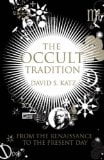 The Occult Tradition: From the Renaissance to the Present Day
The Occult Tradition: From the Renaissance to the Present Day
by David S. Katz
Pimlico, £8.99 (pb), ISBN 9780712667869
The main aim of occult practices is “to bring together widely disparate aspects of God’s Creation within a complex structure of connections, sympathies and affinities”. In other words, a supernatural Unified Theory. As Katz points out, this does tend to result in “the readiness to relate the unrelated”, a tendency seen in believers in general.
This is a thorough, highly detailed history of the occult, starting with the ancient Greeks, tracing its development through the Renaissance Neoplatonists, Hermeticists and Kabbalists to the Rosicrucians, Freemasons and Swedenborgians. He also notes the Hermetic roots of Mormonism, which were conveniently forgotten about.
In among the believers there were always sceptics; Hermeticism was debunked by Casaubon in the early 17th century, while the poet Blake challenged Swedenborg. But as ever, they were lone voices in the face of popular belief. The Victorian era was a fertile time, with a revived interest in all things supernatural, the start of psychology, psycho-analysis and anthropology feeding occult interest and Indian ‘mysticism’ thrown into the mix. Jung in particular tried to amalgamate psychoanalysis and the occult.
Meanwhile in America, fundamentalism was born. Perhaps the most speculative part of the book is Katz’s description of it as occult because, he says, fundamentalists believe “firmly in the supernatural world, its influences and manifestations”. Focussing on Revelations and Daniel, they “predict the future through deciphering a document whose meaning is occult, hidden”.
Although this element of fundamentalism is occult in that sense, whether the whole of it can be so described is not entirely proven here, as distinct from a more general (and perhaps more lurid) belief in supernatural forces or predicted events common to many religions, myths and superstitions. Belief in the rapture, speaking in tongues, public faith healing and fundamentalism’s grass-roots appeal rather than shrouds of mystery are perhaps a little too overt to qualify as occult.
That said, this is a useful resource, illustrating both the influences of different people and groups on the occult and the occult’s own influence on society, science and modern beliefs, from the born-again to New Agers.
Tessa Kendall

